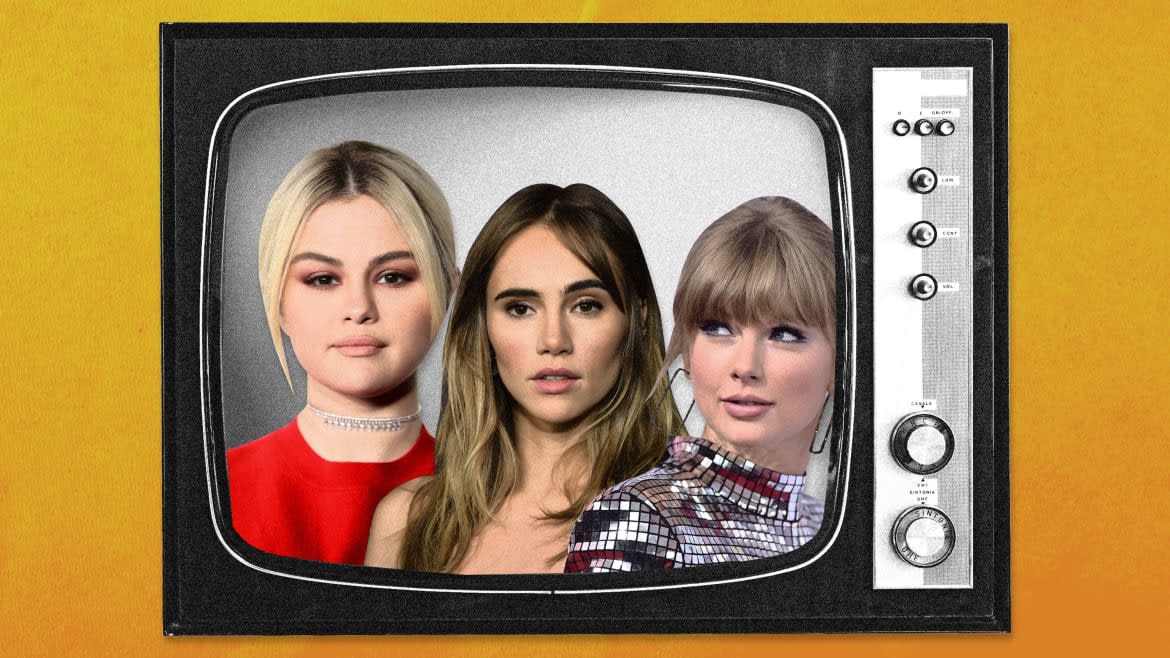Selena Gomez and the Sensitive Celebs Joke-Policing TV Shows

- Oops!Something went wrong.Please try again later.
- Oops!Something went wrong.Please try again later.
- Oops!Something went wrong.Please try again later.
- Oops!Something went wrong.Please try again later.
- Oops!Something went wrong.Please try again later.
- Oops!Something went wrong.Please try again later.
In 2019, tensions between pop stars and journalists reached boiling point. Lizzo was attacking Pitchfork for allowing a non-musician to review her album Cuz I Love You. Justin Bieber accused an E! News host of “bullying” for suggesting that he lip-synced during Ariana Grande’s Coachella set. Grande also chimed in with a remark about bloggers not being “lit inside” that instantly became a meme. Lana Del Rey famously chided NPR music critic Ann Powers for innocuously stating that she had a persona. And although it occurred the following year, I would be remiss not to mention the Alison Roman-Chrissy Teigen squabble over cookware lines that ended in Roman being ousted from The New York Times.
This series of incidents sparked important conversations about the responsibility celebrities have on social media when waging war against writers and usually, as a result, inciting online harassment from their army of stans. Aside from Lizzo issuing an apology for the time she dragged an UberEats driver on Twitter after she thought she stole her food, the celebrity class hasn’t exhibited that much awareness regarding the disproportionate power they can wield against regular people over the most inconsequential matters.
Likewise, on Tuesday night, pop singer and actress Selena Gomez thought it was necessary to go on Twitter and call out the writers at Paramount+’s The Good Fight for an episode featuring a joke riffing on another series of jokes that were told on Peacock’s reboot of Saved by the Bell about a kidney transplant she received in 2017.
“I am not sure how writing jokes about organ transplants for television shows has become a thing but sadly it has apparently,” she tweeted. “I hope in the next writer’s room when one of these tasteless jokes are presented it’s called out immediately and doesn’t make it on air.”
I am not sure how writing jokes about organ transplants for television shows has become a thing but sadly it has apparently. I hope in the next writer’s room when one of these tasteless jokes are presented it’s called out immediately and doesn’t make it on air.
— Selena Gomez (@selenagomez) August 3, 2021
“My fans always have my back. LOVE YOU. If you are able to please sign up to be an organ donor,” she followed up with a link to organdonor.gov.
Some context—last year, after Selenators called for the cancellation of Saved by the Bell on Twitter, Peacock issued an apology and made a donation to the Selena Gomez Fund for Lupus Research at USC. Gomez’s donor, actress Francia Raisa, accepted the streamer’s apology in a tweet, as the characters on the show speculated about who “actually” gave Gomez her new kidney—an understandably touchy bit regarding such a serious and life-altering contribution. Subsequently, a scene in an episode of The Good Fight that aired last month depicts characters listing off jokes to a television executive that are considered off-limits, including Gomez’s transplant.
Obviously, Gomez’s acknowledgment of this scenario exists in a slightly different context than if she were to call out a music critic for panning an album or accusing her of lip-syncing. For one—and I can’t believe this needs to be said—words spoken by fictitious characters within an imaginary world are not equivalent to words spoken by actual human beings with the ability to affect reality. Nor are the people who create dialogue for these characters necessarily endorsing or condoning the sentiments their characters express when they say things that may not be nice.
The same misreading occurred last week when model-turned-actress Suki Waterhouse, in several now-deleted tweets, called out the writer of an episode of HBO Max’s Gossip Girl in which a character refers to her as a “nobody” in comparison to her movie-star boyfriend Robert Pattinson. While she was correct in pointing out the show’s inconsistencies with its feminist messaging, she missed the crucial point that this was uttered by one of the series’ “mean girls,” automatically classifying the remark as petty. This also brings to mind the Taylor Swift versus Ginny and Georgia incident that happened earlier this year that resulted in the racist harassment of its Black star on her social media accounts, all because the musician was briefly reminded of her self-acknowledged “long list of ex-lovers.”
That being said, the Gomez joke, which was more so just a pop-culture reference, was not a slight to the singer, her fraught medical history or the work of organ donors, but a historically correct remark in a discussion about what kinds of jokes equal a cancellable offense, which her young fans and Gomez inadvertently confirmed for a second time. If anything, Gomez’s delayed admonition days after her fans had been making a fuss about it on social media felt more like an opportunity to publicly connect with her fans, acknowledge their collective power on social media and, most notably, be seen advocating for a good cause.
Ultimately, I can’t be sure whether Gomez was genuinely aggrieved by that line of dialogue when she heard about it. But removing context to earn empathy from the public at the possible expense of less wealthy and powerful individuals feels deeply irresponsible at a time when social media shenanigans can produce real-life consequences. Hopefully, celebrities won’t continue being obtuse about fictional people and diegetic scenarios, but, so far, it seems like an efficient way for them to get the public’s attention.
Get our top stories in your inbox every day. Sign up now!
Daily Beast Membership: Beast Inside goes deeper on the stories that matter to you. Learn more.

